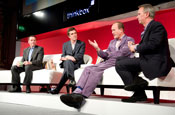
Andy Duncan, chief executive of Channel 4, claims that television is being forced to adapt to a new world in which viewers are using multiple platforms to watch a wider variety of programmes.
Viewers are dictating their own TV schedules through PVR services including Sky+, but broadcasters have also braced themselves by bolstering online catch-up and channel-streaming services, ITV Catch Up, Demand Five and 4oD.
ITV has also combined its online and broadcasting business to create cross-platform content - a sign, according to Duncan, that channels are already being watched in a 'new context'.
With a new era of digital choice, however, comes a stark challenge for commercial broadcasters - that of convincing brands to advertise on these nascent content platforms.
Both Channel 4's closure of digital ad sales house 4DS and its interactive TV and mobile ad sales businesses, and ITV's decision to push back online revenue targets by two years, show that broadcasters are taking steps back-ward as well as forward.
Andrew Pinkness, strategy director at digital media consultancy Rufus Leonard, believes broadcasters are 'rearranging the deckchairs' rather than thinking radically about their new roles. 'They are completely aligned to the old media, judging emerging channels against traditional channels and looking for immediate returns,' he says. 'They need to push the commercial side, not just move on content developments such as the iPlayer.'
Thinkbox, the marketing body for commercial TV, addressed this concern at its Televisionaries event last week. The intention was to debate the future of television and brands on TV at a critical stage of their development, but it was no surprise that on-demand content was high on the agenda.
Thinkbox chief executive Tess Alps said at the conference that TV content is being 'liberated through online distribution' as more people access TV pro-grammes via iPlayer, ITV.com and 4oD.
A Channel 4 study also suggests that, for advertisers, video-on-demand services can even offer stronger brand awareness. A study of ads from brands including O2, Toshiba and Vauxhall on 4oD, viewed via Virgin media's TV plat-form, found a doubling of ad awareness when compared with linear TV.
Mike Parker, Channel 4's head of strategic sales, says the study confirms that brand exposure through on-demand services is 'arguably even more valuable because of the higher attention factors'.
Pinkness agrees that viewers are more receptive to pre-roll ads around on-demand television content because it is 'lean-forward' TV. However, there is a chance that this will come at the expense of linear TV ads in the years to come. 'Broadcasters will certainly have to think harder about making their TV ads more valuable and relevant to audiences,' he adds.
This point was also raised at the conference as Roisin Donnelly, head of marketing at Procter & Gamble, told delegates that her 'greatest wish' for the future of TV is targeted ads, adding that she is excited by the prospect of sending Pampers TV ads only to households with babies, or a Pantene ad aimed only at viewers with blonde, curly hair.
Nick Gill, executive creative director at Bartle Bogle Hegarty, told the forum that such desires present significant challenges to the old guard. 'The comm-on 30-second spot that attempts to reach so many people might struggle in the new advertising age,' he said.
In response, added Gill, brands could create short, micro-targeted ads. Or they could fill entire ad breaks with one epic TV event ad, similar to Honda's sky-diving execution, designed to be a talking-point for a mass audience.
TV stalwarts remain convinced that their content has a part to play in catering to the human desire to be part of something bigger. Peter Fincham, ITV's director of television, told delegates that even in 'the YouTube age', people make a talent show, football match or soap opera their evening's viewing.
Nonetheless, he also conceded that people 'graze' TV while using their laptops. 'It means that television needs to acknowledge throughout its output that people have got a choice - they can always switch it off,' he said.
The challenge for broadcasters is to make content more compelling and entertaining, in whatever format consumers want it.
The same is true for brands, or so warns BBH's Gill. 'So cluttered will be the television landscape of tomorrow, such will be the impact of digital TV, that in the future all ads will be duty-bound to entertain. If they don't, they won't stand a chance.'

